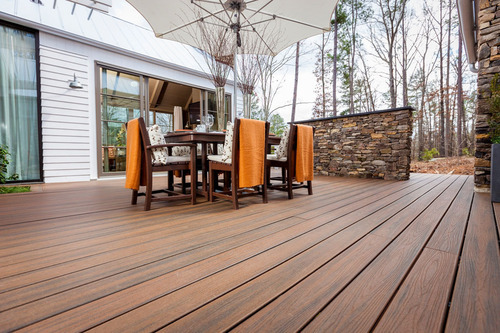Ron Kaplan: “A company moving in to the abyss did not need a manager who was in charge of disposing of money”.
Trex was a monopoly, but it was also so arrogant to an extent that almost killed it. Ron Kaplan rescued the synthetic terrace flooring pioneer by treating it like a start-up.
When Ron Kaplan became the CEO of Trex in January 2008, he knew that this composite wood flooring manufacturer has major problems with quality, turnover is decrasing, but loss is increasing. Last year, Trex’s turnover was $ 329 million, loss reached $ 76 million, but company’s debt had raised to $ 134 million.
However, Kaplan did not know that theexceptionally high debt-to-profit ratio at Trex did not meet the bank’s loan conditions (he found that out only in a board meeting on the second day as CEO). In fact, Trex was on the brink of bankruptcy. He made every effort to meet face-to-face with the president of the bank. “I asked: do you want to run this business, or do you want me to run it?”
Trex’s creditors complied to Kaplan’s 30 years of experience in manufacturing and it appears, their decision saved the company, Even though the sales haven’t risen that much under Kaplan’s leadership ($381 million over the past four quarters) , the company is now able to generate $ 51 million in profits. But its debt? Zero. The Wall Street has noticed it aswell. Trex stock price fell by 83% between 2005 and 2007, but has grown more than 900 percent since Kaplan came aboard. “So far, I have not seen such a successful and extensive turnaround of a company in the construction materials industry,” says Trey Grooms, managing director of equity research at Stephens.
What really happened? It’s a classic case of focus. Trex lost focus as it felt like a virtual monopoly meant it had no pressure to maintain quality. Kaplan used company’s culture and the product itself to recover.

Let’s remember that Trex invented the synthetic decking for terraces. In the 1990s, some Mobil Oil engineers figured out how to make floor decking for terraces using plastic waste and scrap wood – creating a composite that wouldn’t decay or splinter. Trex claims the product will last for 25 years without painting and will not even fade; In contrast to the pressure-treated wood stock flooring that requires annual maintenance and lasts for only seven years.
Four Mobil executives saw large opportunities in the production of outdoor terrace flooring (back then a $2 billion market, now $7 billion), they bought a unit in 1996 from a parent company and then rapidly expanded it. From 1998 to 2004, sales increased from 47 million to 254 million dollars. Furthermore, along with the turnover, the stock prices increased as well upon the public stock market launch in 1999.
They already controlled 90% of the market, but wanted to take an even bigger bite off of it. It turned out to be a mistake. If you visit Trex’s headquarters in Winchester, Virginia, in the foothills of the Shenandoah Mountains, it’s immediately obvious that trash is key source for manufacturing. Trucks bring huge loads of plastic bags covered in supermarket logos every day. Here all this is recycled into nearly gold.
Plastic waste is heated and mixed with industrial wood shavings to create composite boards for terraces.
However, in 2003, Trex’s management attempted to lower expenses by purchasing plastic of lower quality (yes, there’s a quality hierarchy for plastic bags), and the results were abysmal.
Customers started noticing that their new terrace flooring decays quickly and started filing lawsuits (Trex settled court proceedings in 2010 but still continues to pay for the replacement of defective decks). In the mean time, new rivals such as Fiberon and AZEK stepped in and started offering more durable products. Although two former Trex executives from the original team returned from retirement to try to fix mistakes in the company’s operation, the damage was already done. Trex’s market share shrunk to 30 percent. The problem solution turned out to be as dangerous as the problem itself. The decision to increase the number of employees in order to ensure better manual quality control, increased the expenses, pushing the company into working at a loss.
Then Kaplan showed up. “We were almost instantly certain that Ron was the right person,” says Frank Merlotti Jr.,Trex board member since 2006. “He had a particular confidence and ease. He is a man who knows what he wants, and he can make everyone follow the direction he sets. “
Raised in a family of military veterans and armed with a Wharton Business school Master’s degree in business management, Kaplan spent 26 years in Harsco, where he managed factories for propane tanks and high-pressure cylinders. He proved himself to be a very strong leader, also criticizing staff if needed. This strict approach was like a cold shower to the Trex’s collegial culture. On a Friday this freshly introduced manager promised not to change company’s employee dress code, but then announced that on Monday he will decide which employees deserve to remain in their jobs. “Those who bought their clothes in the exclusive Neiman Marcus had a fun weekend,” he jokes.
Managers had to save the company’s money.
He dismissed ten of his eleven vice-presidents, as well as 30 managers, including one whose primary responsibility was to monitor charity donations.
“In my opinion a company moving in to the abyss did not need a manager who was in charge of disposing of money”, says Kaplan, a 63-year-old man with a cautious gait that resembles robot movements. The offices of the dismissed managers were let to an X-ray centre and physical therapy clinic. However, he did not dismiss only the managers. In 2008, when the plant had automation improvements, more than 30% of full-time workers were released from employment, while the remaining workers were offered productivity-enhancing measures. Managers earned bonuses based on the company’s financial performance, while factory workers could boost their income by up to 15% as long as they were able to hit business KPIs.
When the culture of the company was brought to order, Kaplan turned to the core of this problem – the product. In order to regain market share, he introduced a new product line with innovations that people were used to seeing in Trex products. Transcend was the first composite board with hard shell. As a result, it became more flexible and looked like natural wood. The hard top layer enabled the company to offer a 25-year warranty and also a higher price. Previously Trex charged two to three dollars for an about 30 centimetre long board but the new price is 3.75 dollars. “Millennials are not like the post-war generation,” says Adam Zambanini, vice president of marketing. “They don’t want to think about the maintenance.”

Even with more expensive products, Trex owns 40% of the composite market. And Kaplan does not plan to provide only those people who like to grill meat on a terrace once in a while. “Trex can be considered as a manufacturing company for terrace flooring and railing,” says Kaplan. “Another way to look at it is as a recycling and extrusion company.”
In order to obtain the plastic it requires for operation, Trex has to accept all the polyethylene delivered to it by retailers like Wal-Mart. This means that a lot of things are left over. Instead of reselling it at cost, Kaplan plans to create other products. He will start with small polyethylene pellets that can replace virgin resin for plastic producers.
Why deal with plastic products? Kaplan thinks his formula can work in any industry, although it might seem like a thought that would distract and Trex would once again experience a collapse. It should be remembered that the company saviour has its own privileges. Investors will allow him to risk with the company’s money if there is no debt in on the company’s balance.
“Kaplan is a man who knows what he wants, and he can make everyone follow the direction he sets.”



